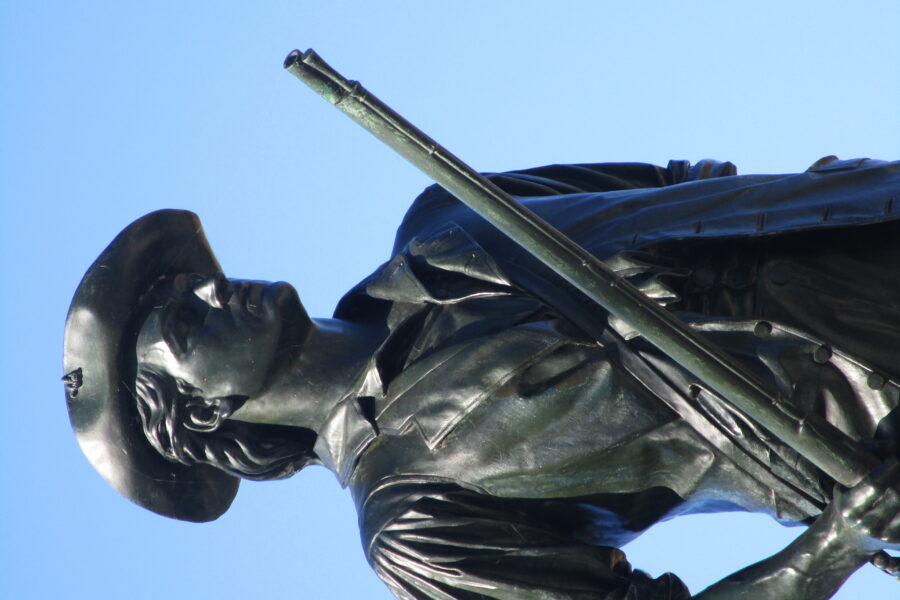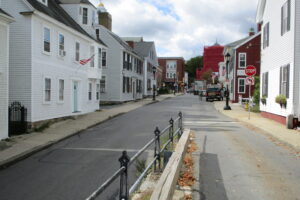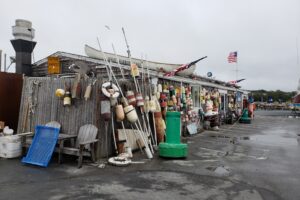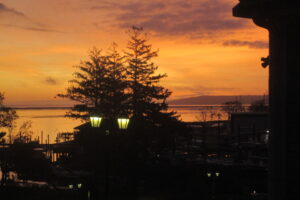Many of the places on our To See List are hours (only because of traffic) away, and the weather has not been stellar. So, when there is a day forecast with NO rain, we are in the car, headed somewhere. Today it is Concord. We want to see the place where it all started with “The shot that was heard around the world.”
Practicing Flexibility
Eating first, before the hordes descend, seems the most logical thing to do, but my restaurant of choice disappears behind us as Michael misinterprets my unclear exclamation of, “There it is!” And now — now we are stuck in the middle of a train of Swap Meet traffic. Worse than any Market Day traffic in Wimberley ever thought of being.
Michael suddenly makes a daring U-turn in the middle of too many cars and looks at me, the navigator, for further instructions. “Just drive—anywhere,” does not go over too well with him. So, I quickly find a direction and the name of a road.
Bartlett’s Farm

We wind up at a roadside farm stand looking for tomatoes. Bartlett’s Roadside Farm Stand as it turns out. The farm that played a pivotal part in the battle of Concord. The reason British soldiers marched to Concord on the night of April 18, 1775, was to seize a cache of weapons being stored on the farm of Colonel James Barrett, whose old home is directly across the street from where we stand.

However, after searching the house and other buildings that are on the property, the British were not able to find any weapons. The Patriots’ spies informed them ahead of time the intention of the British soldiers. By the morning of April 19th, all weapons had been moved elsewhere.
There were No weapons. There are NO tomatoes. And now we have NO choice but to go immediately to the bridge where the first shot was fired in the Revolutionary War.
Minute Man National Historical Park

At least that is what I tell Michael. And because I am not very bright, I do not turn on the audio for Google maps, but once again guide Michael to our destination with my own interpretation of the map. All I can say about that is—at least we are still married.

Being here, it looks like everyone else determined that visiting Concord on this day was a great idea too. Including hordes of teenagers on a school outing. We go the opposite direction of where they are headed, perusing the museum, watching the film, taking our time.

We begin the long walk downhill toward the bridge. As we approach it, the high-schoolers are joyously running and jumping, screaming and hollering, making their way quickly toward us. We stand still as ancient statues until they are safely past. And I know they think we are ancient and totally in the way. Someday they will think people our age holding hands are cute. Someday.

Concord Bridge

Guarded by the statue of a heroic Minute Man, it is an assuming little bridge and a lovely little river that lazily rolls along beneath it.
Try as I might I can’t hear the shots or imagine that day.



The Patriot’s won that skirmish. The British were outnumbered, the main contingent was at Bartlett’s Farm with only 100 soldiers left guarding the bridge. And they were shocked that the Colonial Militia would fire back. They retreated. I would retreat.
We explore our surroundings for a while, then decide to see if we can find the Colonial Inn, built in 1716 in downtown Concord, one more time.


The Colonial Inn


We find it! The restaurant. The parking lot. A place to park—barely. The hostess tells me it will be a fifteen minute wait—a few customers need to pay their bill and leave. The day is sunny, the porch where we sit welcoming, the cute town charming. People watching is to become our entertainment, if not our nourishment for a while.

Thirty minutes later she tells me everyone seems talkative and in no mood to relinquish their tables. An hour later I ask if we should go someplace else. Later still, the hostess comes to get us with a smile on her face. She is the only one smiling. We aren’t angry. Just weary of waiting.
The waitress is charming and friendly and sweet. I order an extra big glass of wine. Michael orders more than one beer. My salmon burger is good if not great. It gets better when I request more sauce, remove the top bun, pour the tzatziki over the salmon and add a dash of salt. I really think dry sandwiches are a Massachusetts thing. I need to stop ordering them. Michael says his burger is great.


Louisa May Alcott’s Orchard House

The day is waning, and I want to see the home of Louisa May Alcott. I don’t remember how many decades ago I read Little Women, but I remember worshiping Joe and wanting to be just like her. Sitting here watching the introductory film, and seeing a historian portray her as she reflects on her family, her times, and her life, the hero worship comes back in a flash. And she’s written dozens of books. I add some of these to my mental to read list.

The second of four daughters, Louisa’s father was Bronson Alcott, a man before his time. He was a teacher, writer, Philosopher, reformer and finally a transcendentalist. As an educator, he pioneered new ways of interacting with young students, focusing on a conversational style, and avoiding traditional punishment. Her father was a great influence on her life, and an advocate for women’s rights.
Louisa Alcott spent most of her life in Boston and Concord, Massachusetts, where she grew up in the company of Ralph Waldo Emerson, Theodore Parker, and Henry David Thoreau. Her education was largely under the direction of her father, for a time at his school in Boston and, later, at home.

She realized at an early age that her father was too impractical to provide for his wife and four daughters. After the failure of a Utopian community that he founded, Louisa Alcott’s lifelong concern for the welfare of her family began. She taught briefly, worked as a domestic, and finally began to write to bring in money for the family.

It is not just the house, but the story, the learning, the discovery and the knowing that is so great. Hearing the story of Ralph Waldo Emerson telling Louisa, during a walk in the woods, that she wasn’t seeing a spider’s delicate web but a fairy’s handkerchief. Poetry. Magic. This is worth this entire day.
The Slow Road Home
Feeling cheated of some of the things I wanted to see in this charming town, surrounded by farms and woodlands, I ask Michael if we can take the slow road home again. He kindly agrees.
What starts out as a tiny curving road edged with crumbling rock walls and stately old houses scattered here and there behind the trees, quickly turns into non-atop suburbia. House after house after house with towns that run together and you only know you are in a different town because the name of the road has changed.
Finally we are home. I’m not sure Michael would call this a stellar day. It might be put in the same category as the weather we experience each week. A few highs — a lot of lows. If only he had Little Women and known Joe. Or at least Little Men.













Leave a Reply
Your email is safe with us.